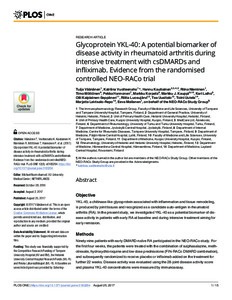Glycoprotein YKL-40: A potential biomarker of disease activity in rheumatoid arthritis during intensive treatment with csDMARDs and infliximab. Evidence from the randomised controlled NEO-RACo trial
Vaananen T; Vuolteenaho K; Kautiainen H; Nieminen R; Mottonen T; Hannonen P; Korpela M; Kauppi MJ; Laiho K; Kaipiainen-Seppanen O; Luosujarvi R; Uusitalo T; Uutela T; Leirisalo-Repo M; Moilanen E
Glycoprotein YKL-40: A potential biomarker of disease activity in rheumatoid arthritis during intensive treatment with csDMARDs and infliximab. Evidence from the randomised controlled NEO-RACo trial
Vaananen T
Vuolteenaho K
Kautiainen H
Nieminen R
Mottonen T
Hannonen P
Korpela M
Kauppi MJ
Laiho K
Kaipiainen-Seppanen O
Luosujarvi R
Uusitalo T
Uutela T
Leirisalo-Repo M
Moilanen E
PUBLIC LIBRARY SCIENCE
Julkaisun pysyvä osoite on:
https://urn.fi/URN:NBN:fi-fe2021042717180
https://urn.fi/URN:NBN:fi-fe2021042717180
Tiivistelmä
ObjectiveYKL-40, a chitinase-like glycoprotein associated with inflammation and tissue remodeling, is produced by joint tissues and recognized as a candidate auto-antigen in rheumatoid arthritis (RA). In the present study, we investigated YKL-40 as a potential biomarker of disease activity in patients with early RA at baseline and during intensive treatment aiming for early remission.MethodsNinety-nine patients with early DMARD-naive RA participated in the NEO-RACo study. For the first four weeks, the patients were treated with the combination of sulphasalazine, methotrexate, hydroxychloroquine and low dose prednisolone (FIN-RACo DMARD combination), and subsequently randomized to receive placebo or infliximab added on the treatment for further 22 weeks. Disease activity was evaluated using the 28-joint disease activity score and plasma YKL-40 concentrations were measured by immunoassay.ResultsAt the baseline, plasma YKL-40 concentration was 57 +/- 37 ( mean +/- SD) ng/ml. YKL-40 was significantly associated with the disease activity score, interleukin-6 and erythrocyte sedimentation rate both at the baseline and during the 26 weeks' treatment. The csDMARD combination decreased YKL-40 levels already during the first four weeks of treatment, and there was no further reduction when the tumour necrosis factor-alpha antagonist infliximab was added on the combination treatment.ConclusionsHigh YKL-40 levels were found to be associated with disease activity in early DMARD-naive RA and during intensive treat-to-target therapy. The present results suggest YKL-40 as a useful biomarker of disease activity in RA to be used to steer treatment towards remission.
Kokoelmat
- Rinnakkaistallenteet [29337]
